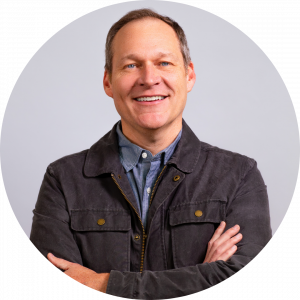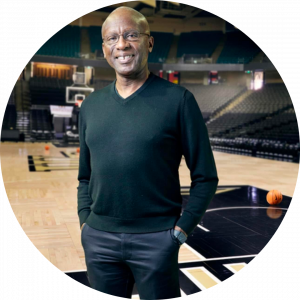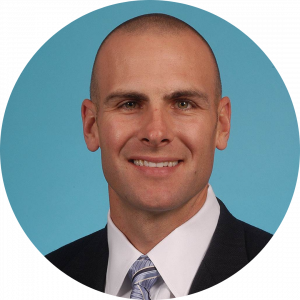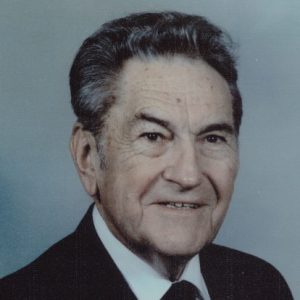To sponsor, purchase a table or purchase a ticket, click here.
To purchase an advertisement in the souvenir event program, please contact Danita Morgan at danita_morgan@unc.edu.

A dynamic enterprise leader and active counselor across clients and sectors, J.J. Carter serves as global chief operating officer and president of Americas at FleishmanHillard.
With a career spanning more than two decades, J.J. is among the highest achievers in sports marketing and communications, a trusted senior adviser to iconic global brands and a proven business leader accelerating global change and impact.
He has led FleishmanHillard through a period of unprecedented growth, during which time the firm distinguished itself as an industry standard-bearer for profitability, inclusion and recognition — earning multiple Agency of the Year accolades from Campaign, PRWeek, ICCO and PRovoke, and topping Best Places to Work lists for LGBTQ+ equality and female executives.
Prior to his executive leadership role, J.J. served as a global client leader and trusted counselor to multiple high-profile companies. Having developed programs on six continents with many of the world’s most prominent brands, athletes and organizations, he excels at connecting brand, business, technology and leadership into cohesive narratives that resonate with employees, customers, investors, business partners and media alike.
A veteran communicator of eight Olympic Games, J.J. has led work for national governing bodies, including the US Olympic and Paralympic Committee and US Ski and Snowboard Association; sponsorship programs on behalf of Visa Inc., Alibaba Group and BMW North America; and major event work for individual athletes, among them international media events with the world’s most decorated Olympian, Michael Phelps.
J.J. has also provided senior counsel for the NBA’s international expansion into China and led global accounts with Nike’s Jordan Brand, Callaway Golf, the Women’s Tennis Association Tour, Electronic Arts (for which he helped win multiple industry awards) and GoPro Inc., which included overseeing communications for its initial public offering — experience he later applied when Fitbit went public.
He was twice recognized as FleishmanHillard Client Relationship Manager of the Year, earned the firm’s prestigious John D. Graham Award for Excellence and was named to PRWeek’s 40 Under 40 list.
Before joining FleishmanHillard, J.J. was already an accomplished global leader in sports marketing and communications.
As director of PR for the Association of Tennis Professionals, the international governing body of men’s professional tennis, he managed media relations, event operations and crisis management for players, tournaments and tour executives. He was responsible for introducing Swiss superstar Roger Federer to the American public during his ascension to the world No. 1 ranking.
Leading PR for the NBA’s Detroit Pistons, J.J. was the team’s primary contact for all communications matters and directed all appearances related to media, sponsorship and community initiatives. He provided counsel to numerous NBA all-stars including Grant Hill, Jerry Stackhouse and Ben Wallace, and helped transition Pistons legendary player Joe Dumars to team president in 1999. J.J. also served as a consultant on all events at the Palace of Auburn Hills, one of the nation’s most profitable entertainment venues. Among those events were the NCAA Regional Basketball Tournament, Heavyweight Championship Boxing, WNBA, Arena Football and more.
J.J. began his career with the NBA’s Dallas Mavericks, where some of his early contributions included the Rookie of the Year campaign for Jason Kidd, launching the team’s first-ever digital presence on NBA.com and supporting the successful public funding referendum for construction of American Airlines Center in downtown Dallas. While with the Mavericks, he provided ongoing media coaching to NBA MVPs Steve Nash and Dirk Nowitzki, as well as Hall of Fame coach Don Nelson.
A graduate of the University of North Carolina at Chapel Hill, J.J. earned a Bachelor of Arts degree in journalism and mass communication with a concentration in public relations. In 2023, he spearheaded the creation of the Carter-Tinson gallery at the UNC Hussman School of Journalism and Media, featuring the “Rising Voices” exhibit which shines a light on work that’s contributing to the public discourse around underrepresented voices and social change.

Skip Foreman is marking his 52nd year in journalism, going back to his days as a reporter at The Daily Reflector of Greenville while he was in high school.
After entering the University of North Carolina at Chapel Hill, he worked for both The Daily Tar Heel and The Black Ink student newspapers, covering news and sports. Following UNC, Foreman joined in 1977 the news staff at WCHL-AM in Chapel Hill, where he reported news and sports, was an afternoon news anchor and a correspondent for the Tar Heel Sports Network.
In May 1979, Foreman joined the Raleigh bureau of The Associated Press. His 43 years with the news cooperative covered the gamut of its work, from news to photography to broadcast to sports and back to news. He would move from Raleigh to the AP’s Charlotte office in 2013. During his time there, he was appointed to the AP’s Race & Ethnicity Team, a position that led him to coverage of the deaths of Black men at the hands of police in Ferguson, Baltimore and Minneapolis-St. Paul. Following the an incident in Minneapolis involving the shooting death of Philando Castile, he would join in coverage of the memorial service in North Carolina and the protests involving the murder of George Floyd. His work also involved coverage of the shooting of two Black men by police in Charlotte, the second of which led to a night of violent protests.
Foreman retired from the AP in July 2022. He joined HBCU Gameday, a website dedicated to coverage of sports and culture at historically Black colleges and universities.
In November 2022, Foreman was hired as regional sports editor for Lee Enterprises for the News & Record of Greensboro and the Winston-Salem Journal. Last June, he represented the two newspapers in coverage of Wake Forest in the College World Series, adding to a career that includes six men’s Final Fours, numerous ACC Tournaments and the arrival of the Charlotte Hornets and the Carolina Panthers.
Foreman is married to Jeri Young, managing editor of the Winston-Salem Journal. They have a son, Trip, who is football operations manager for the Panthers, and a daughter, Katie, who works for World Wildlife Fund.

Melanie Sill is a Pulitzer Prize-winning editor whose career took her from community reporting in the mountains of North Carolina to the top editorial roles at The News & Observer of Raleigh, The Sacramento Bee and Southern California’s KPCC/ LAist public radio, one of the nation’s biggest and most innovative NPR member stations. (She was the first woman to hold each of those roles.)
Melanie chose journalism initially out of a love of writing that blossomed as she learned reporting skills, first in hard news and then as a features reporter for The News & Observer traveling all over the state. Years later, after she moved into leadership as an editor and news executive in North Carolina and California, Melanie became increasingly passionate about journalism’s role in community connection and local democracy. She has been a news industry voice for local news innovation that centers the needs of audiences and communities and that holds diversity, equity and inclusion as fundamental values of journalism excellence.
Melanie was born in Scottsbluff, Nebraska, and raised in the sugar mill town of Waipahu, Hawaii, where she attended public schools. She chose UNC because of its journalism school and broader reputation, though she never visited campus beforehand, and graduated Phi Beta Kappa. The Daily Tar Heel, along with Jim Shumaker in particular, gave Melanie lifelong friendships as well as the experience and clips to launch her career, which began with a brief stint at The Transylvania Times in Brevard, N.C., and then 18 months in United Press International’s Raleigh bureau, which just so happened to be located on the third floor of the N&O building.
While wrapping up a late shift at the UPI bureau in the wee hours one morning, Melanie found herself reading a profile of author and Wake Forest University professor Maya Angelou in the early edition of The N&O and realized how much she missed writing and field reporting. She landed a job soon after as a feature writer for the Raleigh paper, and over six years found stories all over North Carolina, particularly in its eastern half.
Despite an early infatuation with Washington political reporting, Melanie was drawn more to stories about people and places mostly overlooked by journalism. She loved learning about North Carolina through its people, in small pieces like one about a fisherman whose livelihood and family had been hammered by a red tide, and in major projects like one about social segregation separating black students and white students on the UNC campus.
She also served a stint as the paper’s music writer and rock columnist, memorably convincing then-managing editor Bob Brooks that Prince really was “a big deal” and worthy of an arts section cover story. After she became an assistant city editor in the late ‘80s, she gravitated toward bigger stories looking beyond breaking news. These stories began winning awards and prompting community action.
After a Nieman fellowship year in 1993-94, the years when the nascent World Wide Web began connecting people en masse to the internet, Melanie rejoined The N&O’s pioneering online and investigative journalism expansion as its projects and Sunday editor. Among the projects she directed at The N&O was “Boss Hog,” an investigative series and subsequent coverage led by reporters Pat Stith and Joby Warrick (and involving a team of others) that won the 1996 Pulitzer Prize Gold Medal for Public Service. In something new at the time, the stories listed the team’s phone numbers and email addresses, which helped prompt a flood of responses, along with follow-up coverage that eventually led to reforms and a moratorium on new hog operations that remains in place.
Melanie was named N&O managing editor a couple of years after the Pulitzer, then executive editor and senior vice president in 2002. During her time as part of senior leadership, a major journalism review named The N&O one of the 20 best daily newspapers in the United States, citing its deep coverage on significant topics (in particular, education) as well as its public affairs section and investigative journalism. In 2006, The N&O and Charlotte Observer (responding to a seminal statewide report by researcher LeRae Umfleet) hired author Timothy Tyson to help produce a special report on the 1898 coup and massacre of Black residents in Wilmington, N.C., including the role of the newspaper and then-publisher Josephus Daniels in those events and in Democratic Party’s larger white supremacy campaigns. A special section titled “The Ghosts of 1898” appeared in the newspapers and others statewide, including the Wilmington Star-News; the section was reprinted to meet demand from schools statewide.
In late 2007, Melanie moved to California after McClatchy offered her the role of editor and senior vice president for news at The Sacramento Bee, the company’s flagship newspaper. Amid the Great Recession, The Bee greatly increased its digital presence and continued to excel, and Melanie was struck by journalism’s opportunities outside traditional news definitions and approaches.
In mid-2011, she left McClatchy and newspapers to explore how journalism was changing. As executive-in-residence at USC’s Annenberg School for Communication and Journalism, she produced a discussion paper called “The Case for Open Journalism Now” on ways news could work with and for communities in the era of digital and media shift.
She joined Southern California Public Radio — which was expanding rapidly into digital platforms and working to diversify its content, staff and audiences — in 2012 as executive editor, and in 2014 moved into the role of senior vice president for content. As she built a team and added or boosted diverse talent at all levels, the station became competitive as a digital news presence, elevated its investigative reporting to national prominence, added new broadcast programming and greatly increased its community outreach and engagement through live events and other in-person connections.
Melanie’s impact extended beyond her newsroom roles; in 2017, after she returned to North Carolina (which had become home), she began working independently and as a consultant to the Democracy Fund and the NC Local News Lab Fund on efforts to provide broad support to local news providers in our state. She started the NC Local email newsletter in 2018, and in 2020, helped launch the nonprofit NC Local News Workshop at Elon University, serving as its interim executive director for a year and organizing the first-ever NC Local News Summit, now an annual event. Years before, she was one of the founders of the NC Open Government Coalition, also based at Elon. She now supports journalists and local news as a volunteer adviser and board member, including a new effort to start a hub organization to get information to more North Carolinians about how state-level decisions are affecting their lives and well-being.
Throughout her career Melanie has benefited from strong peer friendships and mentorships, and counts among her major personal influences Claude Sitton, the late New York Times civil rights journalist and longtime N&O editor who hired her; Judy Bolch, former N&O managing editor and features editor; Pat Stith, legendary N&O investigative reporter; Anders Gyllenhaal, former N&O executive editor; Orage Quarles III, former N&O publisher and president; Bill Kovach, legendary editor and Nieman curator; Geneva Overholser, former USC Annenberg journalism dean, Des Moines Register editor and one of journalism’s leading public intellectuals; and Bill Davis, former Southern California Public Radio president. Her connections crisscross legacy and startup media, and she works to return the privilege she had by mentoring and encouraging young journalists and emerging media leaders.
In addition to dozens of state and national journalism awards for the newsrooms she led, Melanie has been recognized with UNC’s Distinguished Young Alumni award and The Daily Tar Heel’s Distinguished Alumni honor. She also has served as a juror for the Pulitzer Prizes and Headliner Awards and judge for other state journalism competitions. She lives in Chatham County with her husband, Bennett Groshong, a retired software engineer

Ami Vitale is a Nikon, Canson Infinity and Luminar Neo Ambassador and National Geographic photographer, writer, speaker and documentary filmmaker. She has traveled to more than 100 countries, documenting the heartbreaking realities of war and witnessing the inspiring power of individuals making a difference.
Throughout the years, Ami has lived in mud huts and war zones, contracted malaria and donned a panda suit — keeping true to her belief in the importance of “living the story.” Her award-winning work illuminates the unsung heroes and communities working to protect wildlife and finding harmony in our natural world.
She has been named one of the most influential conservation photographers of her generation and is Conservation International’s Lui-Walton Innovators Fellow. In 2022, she was awarded with the prestigious prizes from the Missouri Honor Medal for Distinguished Service and the Lucie Humanitarian Award. InStyle Magazine named Ami one of 50 Badass Women, a series celebrating women who show up, speak up and get things done. She appeared alongside a group of incredible women including Jane Goodall, Christiane Amanpour and Ruth Bader Ginsburg.
She has also been named magazine photographer of the year in the International Photographer of the Year awards, received the Daniel Pearl Award for Outstanding Journalism and is a six-time recipient of World Press Photos awards. She is author of the best-selling book — “Panda Love” — on the secret lives of pandas.
Ami is also the founder and executive director of the non-profit Vital Impacts, which uses art to empower and engage youth through the arts to become activists and influence their peers in the world. She lectures around the world for the National Geographic LIVE series and was featured on the National Geographic Channel Explorer TV series in 2023.

Eric Montross will be honored posthumously by the NC Media & Journalism Hall of Fame. Eric played for the UNC Tar Heels’ men’s basketball team and legendary head coach Dean Smith from 1990-94, including his freshman and sophomore seasons as a teammate of current Carolina head coach Hubert Davis. He was the starting center in 1993 when the Tar Heels won the NCAA championship.
Eric was named first-team All-ACC in 1993, earning NCAA East Region and Final Four all-tournament honors that same year in leading Carolina to the national championship. He was a member of the John Wooden All-America team as a senior.
A first-round draft pick by the Boston Celtics, Eric played nine seasons in the NBA. He was the analyst on the Tar Heel Sports Network for 18 seasons until he stepped away from the microphone this season. He was also the senior major gifts director at the Rams Club.

Capitol Broadcasting Company (CBC) is a diversified media company founded in 1937 known for its three television and nine radio stations across North Carolina in addition to its ownership of the Durham Bulls minor league baseball team and the Coastal Plain summer baseball league. CBC, the inaugural corporate honoree, is represented by CEO and Chairman of the Board James Goodmon.
 – John B. Adams – Inducted 1989
– John B. Adams – Inducted 1989John B. “Jack” Adams, a New Jersey native, spent 27 years as a professor in the UNC Hussman School of Journalism and Media, including 10 years as dean. His dedication to teaching young journalists and contributions to UNC-Chapel Hill’s journalism program were exceptional.
Adams started his mass communication career when he enrolled in the University of California at Berkeley at 31. Prior to entering college, he was European sales manager for an American glass company and a real estate broker. He served in the U.S. Air Force, retiring as a lieutenant colonel.
Adams graduated Phi Beta Kappa and with highest honors from Berkeley in two years. Within four more years, he had received master’s and doctoral degrees from the University of Wisconsin.
In Wisconsin, he worked as a copy editor and reporter at The Wisconsin State Journal. He soon became interested in journalism education, and taught at Michigan State University for one year before coming to Chapel Hill. In 1958, he came to UNC as a specialist in mass communication law. He was dean of the MJ-school from 1969 to 1979 and retired in 1985.
He received a teaching-excellence award from UNC, the Chancellor’s Award for Service to Journalism from the University of Wisconsin and the Sigma Delta Chi Award at UNC for his work in freedom of information.
Adams was president of the American Association of Schools and Departments of Journalism in 1975 and served on the executive committee of the International Association for Mass Communication Research and the N.C. News Media Administration of Justice Council in North Carolina.
Adams died in 2015 at age 95.
 – Penelope Muse Abernathy – Inducted 1998
– Penelope Muse Abernathy – Inducted 1998Penelope Muse Abernathy distinguished herself as a leader in developing the New York Times’ business strategy.
Abernathy was born in Laurinburg, N.C., and is a 1973 graduate of the University of North Carolina at Greensboro. She received her M.B.A. in 1985 and a master’s degree in journalism in 2003 from Columbia University in New York City.
Before joining The Times, she was an editor with The Dallas Times Herald, The Charlotte Observer, The Wichita Eagle-Beacon and The Fayetteville Times. At The Fayetteville Times, she won the first of three Penney-Missouri Awards given in consecutive years to its Lifestyle section.
Abernathy joined The New York Times in June 1989 as a corporate planning analyst and later became business manager of The Times’ then-1,000-member news department with its three dozen foreign bureaus and two dozen domestic bureaus.
Thereafter, she was named vice president of planning, responsible for setting The Times’ overall business strategy. She then served as senior vice president of planning and human resources until 1997, where she was responsible for coordinating The Times’ development of staff resources with the requirements of the business strategy and plans.
Serving as senior vice president of planning, Abernathy was responsible for coordinating planning between business and news for the paper’s redesign in 1997, the introduction of the Northeast Edition and the aggressive expansion of the National Edition.
In December 1997, she was named president of The New York Times News Services, a new division of The Times that included The New York Times Syndication Sales Corp., Times News Service, TimesFax, Licensing and Royalties, Photo Archives, Book Development, Large Print Weekly and Crossword Product Development.
After being inducted into the Hall of Fame, she served as general manager of Harvard Business School Publishing and publisher of the Harvard Business Review from 1999 to 2002; senior vice president of the Wall Street Journal from 2003 to 2006, responsible for the business operations of the European and Asian editions, as well as business development for U.S. and international operations; and vice president and executive director of the Media and International Councils of senior business executives at the Paley Center for Media from 2006 to 2008.
Abernathy joined the UNC Hussman School of Journalism and Media in 2008 as the Knight Chair in Journalism and Digital Media Economics, specializing in preserving quality journalism by helping news organizations succeed economically in the digital space. She is the author of “Saving Community Journalism: The Path to Profitability” (UNC Press, 2014) and lead co-author of “The Strategic Digital Media Entrepreneur” (Wiley, 2018).